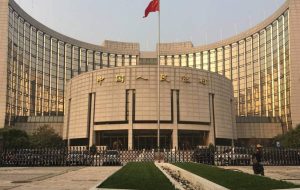Weekly Market Recap (20-24 November)
[ad_1] The PBoC left its LPR rates unchanged as expected: LPR 1-year 3.45%. LPR 5-year 4.20%. PBoC ECB’s Wunsch (hawk – voter) gave a clear signal that the ECB is going to hold rates steady in the next two months, but warned that an easing in financial conditions due to rate cuts bets could prompt

[ad_1]
The PBoC left its
LPR rates unchanged as expected:
- LPR
1-year 3.45%. - LPR
5-year 4.20%.
PBoC
ECB’s Wunsch (hawk
– voter) gave a clear signal that the ECB is going to hold rates steady in the
next two months, but warned that an easing in financial conditions due to rate
cuts bets could prompt further rate hikes:
- Bets on rate cuts
risk prompting rate hikes instead. - Markets are
optimistic to rule out further rate hikes. - But rates should
stay unchanged in December and January.
ECB’s Wunsch
ECB’s de Cos (dove
– voter) pushed back against rate cuts bets:
- ECB is not expected
return to forward guidance on monetary policy. - It is absolutely
premature to start talking about interest rates cuts.
ECB’s de Cos
The US Leading
Economic Index (LEI) posted another decline coming in at -0.8% vs. -0.7%
expected and -0.7% prior. This is the 19th consecutive monthly
decline.
US LEI Index
Fed’s Barkin
(neutral – non voter) repeated that the Fed remains data-dependent and resolute
to keep conditions tighter for longer given the uncertainty around inflation:
- Not a big time to offering
forward guidance. - Fed will respond to
data. - Overall core
inflation numbers are coming down nicely, but a lot of that is for goods. - Business contacts on
the ground report they are still raising prices faster than before
pandemic. - Continue to view
inflation as a stubborn which feeds the higher for longer approach. - Skilled trades
continue to see wage pressures. - Inflation does seem
to be settling but the job is not done.
Fed’s Barkin
BoE’s Governor Bailey
(neutral – voter) reaffirmed the BoE’s “higher for longer” stance given the
tightness in the labour market and elevated wage growth:
- Far too early to be
thinking about rate cuts. - Returning inflation
to 2% target remains our absolute priority. - When inflation is
high, we take no chances. - The tragic events in
the Middle East have added upside risk to energy prices. - Labor market remains
tight despite softening recently. - Wage inflation remains elevated.
- We must be alert to
any second-round effects of higher food and energy prices. - The evolution of
food prices will matter for wage growth looking ahead. - The squeeze on real
incomes from higher food and energy prices may still be influencing wage
demands. - Inflation data for
October released last week were welcome news, it’s much too early to
declare victory. - We must watch for
further signs of inflation, persistence and that may require interest
rates to rise again. - How long a
restrictive stance will be needed will ultimately depend on what incoming
data tells us. - The MPC’s latest
projections indicate that monetary policy is likely to be restrictive for
quite some time yet.
BoE’s Governor Bailey
ECB’s Villeroy
(neutral – voter) threw forward guidance out of the window and reaffirmed the
ECB’s “wait and see” stance:
- Our reliance on
forward guidance was excessive, we should be more modest with future
guidance. - We should expect more
bond volatility, renewed increases would be another reason not to hike
rates. - We have to
discontinue our PEPP reinvestments in due time, and possibly earlier then
the end of 2024. - On our inflation
target, I am not fixated on 2% to the nearest decimal place. - The latest
developments in Israel and the oil market shouldn’t significantly change
downward inflation trend. - We should and can
avoid recession, a soft-landing path is more likely. - The question quickly
shifted from “When will we stop hiking?” to “When will we
start cutting?” - See rates plateauing
for at least the next several meetings and the next few quarters.
ECB’s Villeroy
RBA’s Governor
Bullock remains optimistic on the labour market side but warns against changes
in inflation expectations:
- Optimistic that the
gains made in employment can be kept. - Says inflation is a
crucial challenge in the next one or two years. - Says inflation is
not only about supply issues, gasoline and rent, that there is still
ongoing and underlying demand. - If inflation
expectations adjust higher in response that’s a problem. - We haven’t had any
productivity growth in Australia for a number of years.
RBA Governor Bullock
The RBA released
the Minutes of its November Monetary Policy Meeting, which were more hawkish
than expected:
- Considered case for
raising rates or holding steady. - Board saw
“credible case” that a rate rise was not needed at this meeting. - But judged case for
hiking was the stronger one given inflation risks had increased. - Whether further tightening
required would depend on data, assessment of risks. - Saw risk that
inflation expectations could increase if rates were not raised. - Important to prevent
even a modest further increase in inflation expectations. - Growing mindset
among businesses that cost increases could be passed on to customers. - Noted staff
forecasts for inflation at meeting assumed one or two more rate rises. - Board noted cash
rate remained below that in many other countries. - Rising house prices
could indicate policy was not especially restrictive. - Surge in domestic
population growth made it harder to judge resilience of economy. - Inflation and
economy were slowing, geopolitical and global outlook uncertain. - An escalation in
tensions in the middle east could be a drag on global growth.
RBA
BoE’s Governor
Bailey and other BoE members reaffirmed their commitment to keep monetary
policy tight due to inflation persistence:
- Markets are putting
too much weight on current data releases. - Need to be concerned
about potential inflation persistence. - Need to cement
commitment to 2% inflation target (Mann). - More tightness in
monetary policy now is important (Mann). - Speed limit of UK
economy is low now (Ramsden). - We are very clear in
distancing ourselves from market expectations (Ramsden). - Fall in headline
inflation is not a good guide on inflation trend (Haskel). - We are on target to
get inflation back to 2%. - Latest inflation
fall is good news, largely expected. - There are some signs
that wage growth is coming off. - But there is weakening
in some parts of the labour market. - Inefficient labour
market is one upside risk to inflation. - Approach to monetary
policy can be characterised as being watchful, responsive. - Would not rule out
having to raise the bank rate further in the future.
BoE
The Canadian CPI fell
further on all measures, which is a welcome news for the BoC:
- CPI Y/Y 3.1% vs.
3.2% expected and 3.8% prior. - CPI M/M 0.1% vs. 0.1%
expected and -0.1% prior. - BoC Core Y/Y 2.7% vs.
2.8% prior. - BoC Core M/M 0.3% vs.
-0.1% prior. - CPI Median 3.6% vs. 3.6%
expected and 3.9% prior (revised from 3.9%). - CPI Trimmed-Mean
3.5% vs. 3.6% expected and 3.7% prior. - CPI Common 4.2% vs. 4.3%
expected and 4.4% prior.
Canada Core Inflation Measures
ECB’s President Lagarde (neutral – voter) reaffirmed
the ECB’s “wait and see “ approach:
- We have made those
future decisions conditional on the incoming data meaning that we can act
if we see rising risks of missing our inflation target. - The energy and supply
chain shocks which played a substantial role in last year’s inflation
surge are now unwinding. - We expect headline
inflation to rise again slightly in the coming months. - Our monetary policy
is in a phase where we need to be attentive to the different forces
affecting inflation, but always firmly focused on our mandate. - We will need to
remain attentive until we have firm evidence that the conditions are in
place for inflation to return sustainably to our goal. - Given the scale of
our policy adjustment, we can now allow some time for them to unfold. - This is not the time
to start declaring victory. - Our assessment is
that strong wage growth mainly reflects catch-up effects related to past
inflation, rather than a self-fulfilling dynamic. - We need to remain
focused on bringing inflation back to our target and not rush to premature
conclusions based on short-term developments.
ECB’s Lagarde
The Fed released the Minutes of its November FOMC
Monetary Policy Meeting, which didn’t contain anything new:
All Participants:
- Agreed that monetary
policy should remain restrictive until inflation sustainably moves towards
the Committee’s objective. - Judged maintaining
the federal funds rate at 5¼ to 5½ percent as appropriate. - Agreed on the
necessity of reducing the Federal Reserve’s securities holdings. - Agreed that every
policy decision should be based on incoming information and its
implications for the economic outlook and risk balance.
Most Participants:
- Continued to see
upside risks to inflation, including potential prolonged imbalances in
aggregate demand and supply.
Many Participants:
- Commented on the
significant tightening of financial conditions due to higher long-term
yields. - Observed the
contribution of term premiums to the rise in longer-term Treasury yields. - Noted downside risks
to economic activity, including larger-than-expected effects of tightening
financial and credit conditions.
Several Participants:
- Noted potential
cyber risks and the importance of readiness for such threats. - Commented on the
recent decline in the use of the ON RRP facility. - Emphasized the
importance of banks being prepared to use Federal Reserve liquidity
facilities.
Some Participants:
- Noted benefits for
businesses from improved hiring ability, supply chains, and reduced input
costs. - Reported
difficulties for businesses in passing on cost increases to customers. - Expressed concern
over the sustainability of increased labor supply. - Highlighted
challenges for small businesses due to tighter financial and credit
conditions.
A Few Participants:
- Noted nominal wages
still rising at rates above those consistent with the 2% inflation
objective. - Expressed concern
over the recent pace of increases in labor supply. - Discussed the
importance of monitoring Treasury market functioning and hedge fund
leverage. - Observed that the
process of balance sheet runoff could continue even after reducing the
federal funds rate target range.
Federal Reserve
RBA’s Governor Bullock delivered some hawkish comments
as she sees demand still outstripping supply which could prompt a “more
substantial” monetary tightening:
- Inflation challenge
is increasingly driven by homegrown demand. - ‘More substantial’
monetary policy tightening is right response to demand-driven inflation. - Supply-chain
inflation is easing and has a bit further to run. - Service costs rising
strongly as demand outstrips supply. - RBA liaison with
firms indicates domestic cost pressures are proving persistent. - Will take time to
get inflation back to 2-3% target. - Board seeking to cool
demand while keeping employment growing.
RBA’s Bullock
The OPEC+ meeting was postponed from the 26th
to the 30th of November. Saudi officials have expressed
dissatisfaction with the oil production levels of other member countries. The
kingdom, which has voluntarily reduced its oil output by an additional 1
million barrels per day since July, is currently engaged in challenging negotiations
with other OPEC+ members about their production rates.
The length of the potential delay for the meeting is
still unclear, as no final decision has been made yet. This information comes
from delegates involved in the talks, who have requested anonymity due to the
private nature of the discussions. Crude Oil sold off on the news but erased the losses in the following days.
OPEC
The US Durable Goods Orders missed expectations across
the board with negative revisions to the prior figures:
- Durable goods -5.4%
vs. -3.1% expected and 4.0% prior (revised from 4.7%). - Ex transportation
0.0% vs. 0.1% expected and 0.2% prior (revised from 0.5%). - Ex defense -6.7% vs.
5.0% prior (revised from 5.8%). - Non-defense capital
goods ex air -0.1% vs. 0.1% expected and -0.2% (revised from 0.6%).
US Durable Goods Orders
The US Jobless Claims beat expectations across the
board with Continuing Claims falling for the first time in two months. This
data set covered the NFP survey week:
- Initial Claims 209K
vs. 226K expected and 233K prior (revised from 231K). - Continuing Claims
1840K vs. 1875K expected and 1865K prior (revised from 1862K).
US Jobless Claims
BoC’s Governor Macklem reaffirmed their “wait and see”
approach:
- Canada interest
rates may now be restrictive enough. - Excess demand that
made it too easy to raise prices is now gone. - Reiterates that if
high inflation persists, the Bank of Canada is prepared to raise its
policy rate further. - The Canadian economy
is approaching balance, we expect it to remain weak for the next few
quarters, which means more downward pressure on inflation. - Inflation in Canada
is still too high and progress cutting it is slower than we had hoped. - Expectations for
near-term inflation have been slow to come down and this is a concern. - Long-term inflation expectations
have remained well-anchored. - The latest CPI
number was certainly encouraging. - Good news for
Canadian citizens. - Right now, is not
time to be thinking about cutting rates. - We do not have to
wait until inflation is back to 2% before we cut interest rates, but we do
need to wait until it’s clear that we are on that path to hitting 2%. - When it comes to
monetary policy, we will be taking it one meeting at a time. - If inflation keeps
coming down, if we see underlying inflationary pressures ease, we probably
won’t have to raise rates further.
BoC’s Macklem
ECB’s Nagel (hawk – voter) reaffirmed that the central
bank has reached its terminal rate and from now they will just keep rates
steady as long as necessary to get to the 2% target:
- Believes the ECB
is close to a level considered as the terminal rate. - Uncertain if the
ECB will implement further rate increases. - He anticipates
that the ECB rates will remain stable for some time. - There is no
concern that the ECB is moving toward a hard landing. - Acknowledges the
existence of some risk factors that could potentially trigger inflation. - We will get to our
2% inflation target in the end. - It is too early to
talk about rate cuts. - Rates must stay high to bring inflation
back to target. - Still cannot be sure if we have reached a
peak in rates. - The goal is in sight in terms of inflation,
but not yet reached. - Inflation could still tick up in the coming
months. - Does not see a hard landing for Eurozone
economy.
ECB’s Nagel
Thursday was the PMIs day
with the US on holiday for Thanksgiving Day:
- Australia Manufacturing
PMI 47.7 vs. 48.2 prior. - Australia Services PMI 46.3 vs. 47.9 prior.
- Eurozone
Manufacturing PMI 43.8 vs. 43.4 expected and 43.1 prior. - Eurozone Services
PMI 48.2 vs. 48.1 expected and 47.8 prior. - UK Manufacturing PMI
46.7 vs. 45.0 expected and 44.8 prior. - UK Services PMI 50.5
vs. 49.5 expected and 49.5 prior.
PMI
The ECB released the
Accounts of its October Monetary Policy Meeting:
- All members agreed to maintain interest rates at current levels.
- Members
argued in favour of keeping the door open for a possible further rate hike. - The
view was held that all three elements of the reaction function were moving in
the right direction. - ECB
should be ready for further rate hikes if necessary. - It
could be expected that, based on the current outlook, inflation return to 2%
target by 2025. - Members
agreed to continue applying flexibility in reinvesting redemptions falling due
via PEPP. - Discussion of an early termination of PEPP reinvestments currently seen
as premature. - Most of the impact of past rate hikes had yet to materialise.
- It
was generally assumed that the “last mile” of bringing inflation back
to target was the most difficult.
ECB
The New Zealand Retail
Sales beat expectations:
- Retail Sales Q/Q
0.0% vs. -0.8% expected and -1.8% prior. - Retail Sales Y/Y -3.4%
vs. -3.5% prior. - Retail Sales
excluding Autos Q/Q 1.0% vs. -1.5% expected and -1.6% prior.
New Zealand Retail Sales YoY
The Japanese CPI missed
expectations across the board:
- CPI Y/Y 3.3% vs. 3.4%
expected and 3.0% prior. - Core CPI Y/Y 2.9%
vs. 3.0% expected and 2.8% prior. - Core-Core CPI Y/Y
4.0% vs. 4.1% expected and 4.2% prior.
Japan Core-Core CPI YoY
The Japanese
Manufacturing PMI missed expectations while the Services PMI ticked higher:
- Manufacturing PMI
48.1 vs. 48.8 expected and 48.7 prior. - Services PMI 51.7
vs. 51.6 prior.
Japan Manufacturing PMI
BoE’s Pill (neutral –
voter) reaffirmed that the central bank is going to hold rates high amid
elevated inflation:
- We cannot afford to ease off tight monetary policy.
- UK
monetary policy was in a difficult phase amid “stubbornly high” price
pressures. - Had
to resist temptation to declare victory on inflation battle as October print
remains high. - There’s slower growth in activity and employment.
- Key indicators that BoE are focusing on i.e. services inflation, pay
growth remain at “very elevated levels”. - The
challenge is to ensure that there is enough persistence in restrictive monetary
policy to bring inflation down.
BoE’s Pill
ECB’s Holzmann (hawk –
voter) pushed back against rate cuts expectations as he still sees high
inflationary pressures:
- The chances of
another rate hike are no smaller than that of rate cuts. - We still have high
inflation pressures. - There are differing
expectations within the ECB in terms of what can yet happen. - That is influenced
to a point by how high inflation is in each country. - My suggestion on
PEPP would be to reduce reinvestments step by step starting from March.
ECB’s Holzmann
ECB’s President Lagarde
(neutral – voter) reaffirmed their “wait and see” stance:
- We have already done
a lot on rates, can now observe. - The battle against
inflation is not over. - We are not declaring
victory yet. - We are seeing
progress on inflation.
ECB’s President Lagarde
ECB’s de Guindos (neutral
– voter) highlighted the stagnation in the Eurozone economy:
- Euro area economy is
stagnating in 2nd half of 2023. - Q4 GDP will likely
be similar to Q3. - Risks tilted to the
downside. - Current level of rates
held for long enough will likely tame inflation going forward.
ECB’s de Guindos
The Canadian Retail Sales
beat expectations:
- Retail Sales
September 0.6% vs. 0.0% expected and -0.1% prior. - Retail Sales ex auto
0.2% vs. -0.2% expected and 0.2% prior (revised from 0.1%). - Retail Sales ex auto
and gas -0.3% vs. -0.3% prior. - October advanced estimate 0.8%.
- Retail Sales Y/Y 2.7%
vs. 1.7% prior (revised from 1.6%).
Canada Retail Sales YoY
The S&P Global US
PMIs were basically in line with expectations with a slight miss in the
Manufacturing PMI and slight beat in the Services PMI:
- Manufacturing PMI
494. Vs. 49.8 expected and 50.0 prior. - Services PMI 50.8 vs.
50.4 expected and 50.6 prior. - Composite PMI 50.7 vs.
50.7 prior.
Key line from the report:
“As a result of subdued demand and decreasing backlogs, companies reduced
their workforce for the first time since June 2020, affecting both service
providers and goods producers.”
US Manufacturing PMI
The
highlights for next week will be:
- Tuesday: Australian
Retail Sales, US Consumer Confidence. - Wednesday: Australian
Monthly CPI, RBNZ Policy Decision, US GPD Q3 2nd Estimate. - Thursday: Japan
Industrial Production and Retail Sales, China PMIs, Switzerland Retail Sales,
Eurozone CPI and Unemployment Rate, Canada GDP, US Core PCE, US Jobless Claims. - Friday: Japan
Jobs data, China Caixin Manufacturing PMI, Switzerland GDP, Canadian Labour
Market report, Canada Manufacturing PMI, US ISM Manufacturing PMI
That’s all folks. Have a
nice weekend!
[ad_2]
لینک منبع : هوشمند نیوز
 آموزش مجازی مدیریت عالی حرفه ای کسب و کار Post DBA آموزش مجازی مدیریت عالی حرفه ای کسب و کار Post DBA+ مدرک معتبر قابل ترجمه رسمی با مهر دادگستری و وزارت امور خارجه |  آموزش مجازی مدیریت عالی و حرفه ای کسب و کار DBA آموزش مجازی مدیریت عالی و حرفه ای کسب و کار DBA+ مدرک معتبر قابل ترجمه رسمی با مهر دادگستری و وزارت امور خارجه |  آموزش مجازی مدیریت کسب و کار MBA آموزش مجازی مدیریت کسب و کار MBA+ مدرک معتبر قابل ترجمه رسمی با مهر دادگستری و وزارت امور خارجه |
 مدیریت حرفه ای کافی شاپ |  حقوقدان خبره |  سرآشپز حرفه ای |
 آموزش مجازی تعمیرات موبایل آموزش مجازی تعمیرات موبایل |  آموزش مجازی ICDL مهارت های رایانه کار درجه یک و دو |  آموزش مجازی کارشناس معاملات املاک_ مشاور املاک آموزش مجازی کارشناس معاملات املاک_ مشاور املاک |
برچسب ها :Market ، November ، Recap ، Weekly ، Weekly Market Recap
- نظرات ارسال شده توسط شما، پس از تایید توسط مدیران سایت منتشر خواهد شد.
- نظراتی که حاوی تهمت یا افترا باشد منتشر نخواهد شد.
- نظراتی که به غیر از زبان فارسی یا غیر مرتبط با خبر باشد منتشر نخواهد شد.




ارسال نظر شما
مجموع نظرات : 0 در انتظار بررسی : 0 انتشار یافته : 0